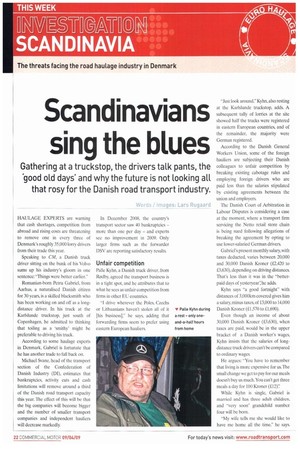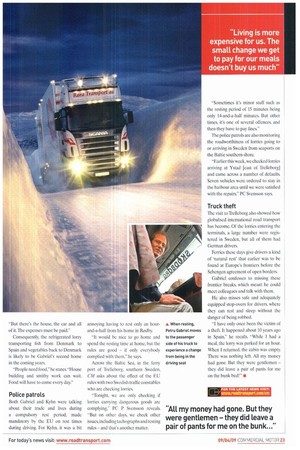Scandinavians sing the blues
Page 22

Page 23

If you've noticed an error in this article please click here to report it so we can fix it.
Gathering at a truckstop, the drivers talk pants, the good old days and why the future is not looking all that rosy for the Danish road transport industry.
HAULAGE EXPERTS are warning that cash shortages, competition from abroad and rising costs are threatening to remove one in every three of Denmark's roughly 35,000 lorry drivers from their trade this year.
Speaking to CM, a Danish truck driver sitting on the bunk of his Volvo sums up his industry's gloom in one sentence: "Things were better earlier."
Romanian-born Pam Gabriel, from Aarhus. a naturalised Danish citizen for 30 years, is a skilled blacksmith who has been working on and off as a longdistance driver. In his truck at the Karislunde truckstop, just south of Copenhagen, he admitted to thinking that toiling as a 'smithy' might be preferable to driving his truck.
According to some haulage experts in Denmark, Gabriel is fortunate that he has another trade to fall back on.
Michael Svane, head of the transport section of the Confederation of Danish Industry (DI), estimates that bankruptcies, activity cuts and cash limitations will remove around a third of the Danish road transport capacity this year. The effect of this will be that the big companies will become bigger and the number of smaller transport companies and independent hauliers will decrease markedly. In December 2008, the country's transport sector saw 40 bankruptcies — more than one per day — and experts see no improvement in 2009. Only larger firms such as the forwarder DSV are reporting satisfactory results.
Unfair competition
Palle Kyhn, a Danish truck driver, from ROclby. agreed the transport business is in a tight spot, and he attributes that to what he sees as unfair competition from firms in other EU countries "I drive wherever the Poles. Czechs or Lithuanians haven't stolen all of it [his business]." he says, adding that forwarding firms seem to prefer using eastern European hauliers. "Just look around," Kyhn, also resting at the Karlslunde truckstop, adds. A subsequent tally of lorries at the site showed half the trucks were registered in eastern European countries, and of the remainder, the majority were German registered.
According to the Danish General Workers Union, some of the foreign hauliers are subjecting their Danish colleagues to unfair competition by breaking existing cabotage rules and employing foreign drivers who are paid less than the salaries stipulated by existing agreements between the union and employers.
The Danish Court of Arbitration in Labour Disputes is considering a case at the moment, where a transport firm servicing the Netto retail store chain is being sued following allegations of breaking the agreement by opting to use lower-salaried German drivers.
Gabriel's present monthly salary, with taxes deducted, varies between 20,000 and 30,000 Danish Kroner (f2,420 to £3,630), depending on driving distances That's less than it was in the "betterpaid days of yesteryear','he adds.
Kyhn says "a good fortnight" with distances of 3,000km covered gives him a salary minus taxes, of 13,00010 14,000 Danish Kroner (f1,570 to £1,690).
Even though an income of about 30,000 Danish Kroner (0,630), when taxes are paid, would be in the upper bracket of a Danish worker's wages. Kyhn insists that the salaries of longdistance truck drivers can't be compared to ordinary wages.
He argues: -You have to remember that living is more expensive for us. The small change we get to pay for our meals doesn't buy us much. You can't get three meals a day for 100 Kroner (f12)'," While Kyhn is single, Gabriel is married and has three adult children, and "very soon" grandchild number four will he born.
-My wife tells me she would like to have me home all the time," he says. "But there's the house, the car and all of it. The expenses must be paid.
Consequently the refrigerated lorry transporting fish from Denmark to Spain and vegetables back to Denmark is likely to be Gabriers second home in the coming years.
'People need food:' he states."House building and smithy work can wait. Food will have to come every day.'
Police patrols
I3oth Gabriel and Kyhn were talking about their trade and lives during a compulsory rest period, made mandatory by the EU on rest times during driving. For Kyhn, it was a bit annoying having to rest only an hourand-a-half from his home in Rodby.
"It would be nice to go home and spend the resting time at home, but the rules are good if only everybody complied with them," he says Across the Baltic Sea, in the ferry port of Trelleborg, southern Sweden. CM asks about the effect of the EU rules with two Swedish traffic constables who are checking lorries.
"Tonight, we are only checking if lorries carrying dangerous goods arc complying," PC P Svensson reveals. "But on other days, we check other issues, including tachographs and resting rules and that's another matter. "Sometimes it's minor stuff such as the resting period of 15 minutes being only 14-and-a-half minutes But other times, it's one of several offences, and then they have to pay fines."
The police patrols are also monitoring the roadworthiness of lorries going to or arriving in Sweden from seaports on the Baltic southern shore.
"Earlier this week, we checked lorries arriving at Ystad [east of Trelleborg] and came across a number of defaults. Seven vehicles were ordered to stay in the harbour area until we were satisfied with the repairs," PC Svensson says
Truck theft
The visit to Trelleborg also showed how globalised international road transport has become. Of the lorries entering the terminals, a large number were registered in Sweden, but all of them had German drivers.
Ferries these days give drivers a kind of 'natural rest' that earlier was to be found at Europe's frontiers before the Schengen agreement of open borders.
Gabriel confesses to missing these frontier breaks, which meant he could meet colleagues and talk with them.
He also misses safe and adequately equipped stop-overs for drivers, where they can rest and sleep without the danger of being robbed.
"I have only once been the victim of a theft. it happened about 10 years ago in Spain," he recalls. "While I had a meal, the lorry was parked for an hour. When I returned, the cabin was empty. There was nothing left. All my money had gone. But they were gentlemen they did leave a pair of pants for me on the bunk bed!" •
















































































































































